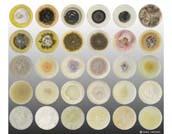Time-lapse View of Ecosystems of the Future
Biology Professor Matthias Rillig of Freie Universität Berlin Receives 2.4 Million Euros to Learn More about Consequences of Gradual Environmental Change by Studying Soil Fungi / With Photos
№ 077/2016 from Mar 22, 2016
How do organisms react as individuals and in communities to environmental conditions that gradually change over a long period? Using a new experimental approach Professor Dr. Matthias Rillig and his team at the Department of Biology at Freie Universität Berlin hope to investigate this issue using the example of soil fungi. The research is being funded for the next five years with almost 2.4 million euros from the European Research Council (ERC) in the form of an Advanced Grant.
Climate changes such as global warming are taking place over long periods of time. Up to now scientists have more or less studied the impact of such environmental influences on ecological systems with experiments in which the environmental conditions – for example, the carbon dioxide concentration in the atmosphere – change relatively abruptly. In the recently approved research project "Gradual and Abrupt Environmental Change: The Connection between Physiology, Evolution, and Composition of the Community" Rillig and his team will take a new approach and examine gradual responses of ecological systems due to slow environmental changes in comparison to the other experiments. The scientists will also investigate how the organisms change in appearance and growth, which evolutionary changes occur, and how this in turn, affects the composition of the communities. The researchers are using soil fungi as a model system for their experiments, as fungi grow very quickly and therefore the impact of environmental changes can be tracked across many generations almost in a time lapse. For some aspects, however, the researchers also want to work with plants to investigate to what extent certain findings can also be applied to other groups of organisms.
The reviewers at the European Research Council praised the particularly innovative nature of the issue and the novel experimental approach as well as the timely relevance of the topic in the context of global climate change. They were also impressed by the excellent scientific environment of the Berlin-Brandenburg Institute of Advanced Biodiversity Research (BBIB). Matthias Rillig has been the director of BBIB since 2013.
Further Information
Matthias Rillig, Institute of Biology, Ecology of Plants, Altensteinstraße 6, 14195 Berlin, Email: matthias.rillig@fu-berlin.de
Press Photos: (The photos may be used free of charge, provided that the proper credit is given.)
Image 1:
The scientists work mainly with soil fungi. Shown here are cultures of several soil fungal isolates, which Matthias Rillig and his team are also using in their experiments. Credit: Dr. Anika Lehmann / Rillig Group
Image 2:
Professor Matthias Rillig. Credit: Baodong Chen


